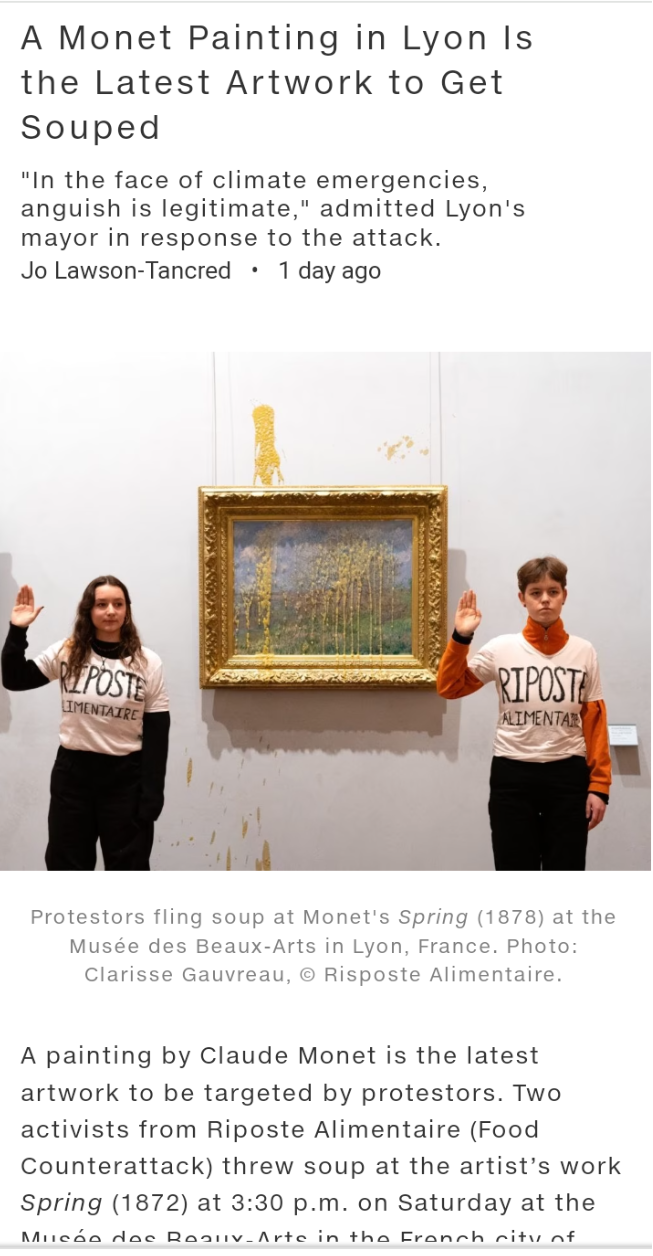#Food Counternetwork
Text

Monet’s red period
He was the sugar-sweet Tchaikovsky of impressionism. But as the Royal Academy's blockbusting new exhibition will show, Claude Monet was also a radical
By Andrew Mar, Sat 9 Jan 1999 22.19 EST
The Guardian
"...There is not much cachet in liking Monet; rather the reverse. This is art for the easy-on-the-eye brigade, the philistine rich and the know-nothing middle classes. Isn't it? He is soft, luscious and commercial; the Tchaikovsky of the paintbrush, turning out sweet, dancing little Sugar Plum fairies of paintings, isn't he? It's clever, technically brilliant; but eye-candy. No?
Such snobbery tends to drive curators to justify Monet exhibitions by insisting on his political and art-revolutionary relevance. There is a slight embarrassment about the very popularity of Monet shows, as if they were like the 'erotica' section in posh bookshops which keep them in business but are hardly the sort of thing one would wish to be judged on.
So the curators of this show have gone to some lengths to reclaim Monet as a hard-edged artist, just as happened with the 1990 show, 'Monet in the Nineties'. Then, the emphasis was on putting Monet's images of haystacks, poplars and Rouen cathedral in the context of resurgent patriotism, closely connected with the land and traditional art: he was political, see. Now, the catalogue includes an essay on the connections between late Monet and New York abstract expressionism - almost as if Monet has to be excused, or validated, by linking him with Jackson Pollock.
In each case, the arguments are meticulous - the US academic Paul Hayes Tucker worked on both exhibitions and contributes a superb essay to the catalogue. And indeed, these are not only deliriously beautiful but also radical, extreme and sometimes even difficult paintings, created by an artist who might have been old - he was 60 in 1900 - but was a full, wide-eyed observer of the first quarter of our tragic century.
When it opens, he is recovering from the great trauma which ripped French society apart a few years before: the Dreyfus Affair, in which a Jewish captain was wrongly accused of passing military secrets to the Germans, court-martialled, degraded and deported to solitary confinement. It split a worried nation in two, with viciously anti-semitic, Catholic and right-wing forces, against the Left and the liberals.
The anti-semitic, anti-Dreyfus campaign included, to their shame, Degas, Renoir and Cézanne. But when, with huge courage, Emile Zola led the charge for Dreyfus, Monet sprung quickly to his defence. Zola was convicted of libel and sentenced to imprisonment; instead he fled to England in 1898..."
"Zola was not a Marxist, but he was anti-capitalist; almost everything he writes is a denunciation of the greed, brutality, corruption and hypocrisy that characterised French capitalism in his day"
Emilie Zola, A Political Reading
#Claude Monet#France#Food Counternetwork#Emilie Zola#Socialist#Free Palestine#Extention Rebellion#Just Stop Oil#Getty Funding#Billionaire Pet Activists#MOMA#The MET#WEF#Russia#Israel#Iran#Argentina#Ukraine#Ireland#Canada
1 note
·
View note